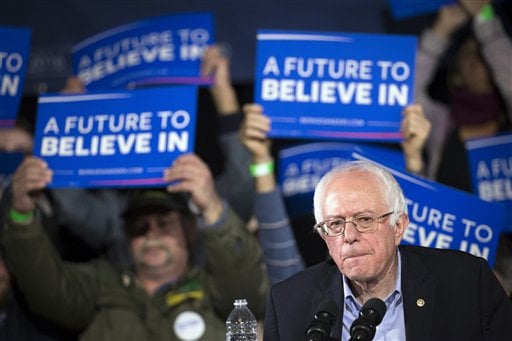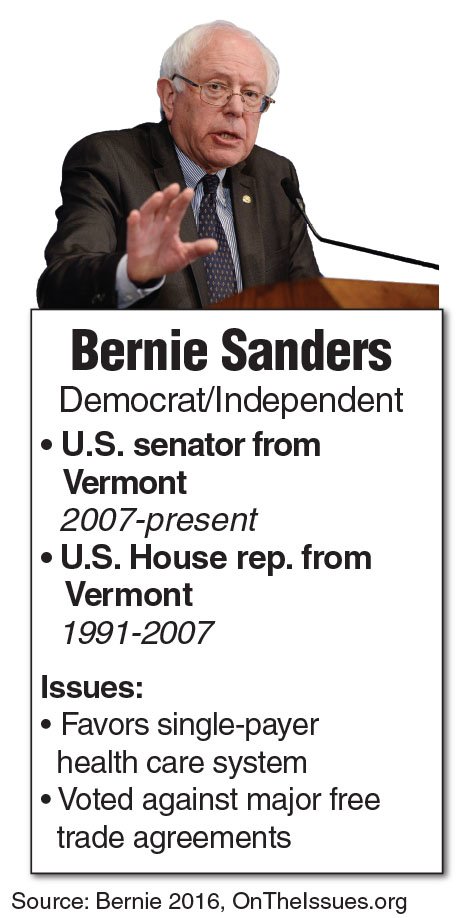
It wasn’t until midday Tuesday that television news channels officially declared Hillary Clinton the winner of last week’s Iowa caucus. The head-to-head race between the former Secretary of State and her Democratic opponent Bernie Sanders was harder to call than many expected. As Clinton won with 49.9 percent of delegates, Sanders trickled close behind at 49.6 percent.
For many, the first caucus proved that Sanders could essentially become a realistic threat to Clinton in the race for the nominee slot. For DePaul student Mackenzie O’Brien, it was a reminder of how far the campaign has come from its early stages.
The first time O’Brien witnessed one of Bernie Sanders’ rallies, the crowd was still quite minimal. It was early last August, as she stood compacted into a tight auditorium in Dubuque, Iowa to watch the Vermont senator introduce himself as the next president of the U.S.
Sanders officially announced his run for the presidency in May. Since then he has garnered younger voters with his stances. In early polls released in July, Sanders had a 24 percent favorable rating, compared to Clinton’s 43 percent. A recent Gallup poll released Feb. 1, showed Sanders with a 53 percent approval rating among Democrats, a four-point lead over Clinton.
Though for O’Brien, and for most attendees at the time, Sanders was far from a familiar face, especially when compared to the popularity of the known Hillary Clinton — who O’Brien supported before reading about Sanders.
“His speech was mostly him taking the time and introducing himself and his platforms to the crowd—which definitely didn’t have as many people as some of the other rallies he did around that time,” O’Brien said. “But it was electrifying to see this small group of people passionately cheer as he went further and further down his list.”
“It was obvious he was beginning to gain momentum back in the late summer months,” O’Brien added.

It was true. As Sanders’ campaign continuously treaded in the following months, his turnouts began reaching more than 20,000 people, breaking records in some states for the largest turnout of any 2016 presidential candidate. Many were millennials.
“As a lot people already know, the major reason Sanders has survived so long against a major power like Clinton, is his major appeal towards young voters —college students,” said DePaul political science instructor Zachary Cook. “What you have are a lot of 17 to 29 year olds who are looking for a political revolution, and Sanders knows that.
“For Hillary, her message and ideals are all about a cautious change in America, while Sanders is very dramatic on changing the entire political system — the establishment,” Cook said.
Known for his distaste of super PAC donations, half of Sanders’ presidential campaign funding has come from small donations from individuals — at a record number of donors at this stage in a presidential campaign. DePaul political science student Lincoln Berget donated for the first time to a political campaign as a Sanders supporter.
“While you may not agree with his message, I think he’s undeniably genuine. He’s not receiving millions of dollars through super PACs from large corporations,” Berget said. “His grassroots campaign has surpassed that of Obama in 2008, where millennials were another large reason that he had won.
“I was overwhelmingly surprised by how close he got in Iowa, which was due to his young voters turning out,” Berget said. “Hopefully he can get more.”
Comparisons can, and have definitely been made to the Vermont senator’s growing popularity and Barack Obama’s 2008 campaign — though Obama did go on to win the Iowa caucus only to lose New Hampshire’s to Clinton. Cook said he believes it’s still too early to determine Sanders’ close tie to Clinton in Iowa as an indicator to a critical threat to Clinton’s nomination.
“It’s true that part of the reason Obama’s campaign became a real threat in 2008 was because of young voters. Both his and Sanders’ campaigns’ rely on this message of change,” Cook said. “Though it has to be noted that the other big reason Obama’s campaign grew popular was because of his appeal to African-Americans and minorities. In the caucuses and primaries to come, if Sanders can get a hold of the minority and black vote, he could easily become a realistic threat to Clinton.”
“The Iowa caucus was basically what the Des Moines Register predicted it to be, and now it’s looking like Sanders will win New Hampshire,” Cook said. “So I’d call him a threat to the caucuses, but not the primaries yet.”

